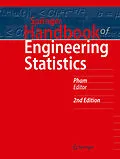This handbook gathers the full range of statistical techniques and tools required by engineers, analysts and scientists from all fields. The book is a comprehensive place to look for methods and solutions to practical problems within - but not limited to - data science, quality assurance in design and production engineering.
The tools of engineering statistics are relevant for modeling and prediction of products, processes and services, but also for the analysis of ongoing processes, the reliability and life-cycle assessment of products and services, and finally to achieve realistic predictions on how to improve processes and products.
This book contains contributions from around 115 leading experts in statistics, biostatistics, engineering statistics, reliability engineering, and related areas. It covers the various methods as well as their applications from industrial control to failure mechanism and analysis, medicine, business intelligence, electronic packaging, and risk management. It enables readers to choose the most appropriate method through its wide range of selection of statistical techniques and tools.
For the second edition all chapters have been thoroughly updated to reflect the current state-of-the-art. Included are also more than 30 completely new contriubutions revolving around current trends related to modern statistical computing, including: data science, big data, machine learning, optimization, data fusion, high dimensional data, voting systems, life testing, related statistical artificial intelligence (AI) and reliability physics and failure mode mechanisms.
This Springer Handbook of Engineering Statistics provides comprehensive literature with up-to-date statistical methodologies, algorithms, computation methods and tools that can be served as a main reference for researchers, engineers, business analysts, educators and students in all applied fields affectedby statistics.
Autorentext
Dr. Hoang Pham is a Distinguished Professor and former Chairman of the Department of Industrial and Systems Engineering at Rutgers University, New Jersey. Before joining Rutgers, he was a Senior Engineering Specialist with the Idaho National Engineering Laboratory and Boeing Company. He received the B.S. degrees in mathematics and in computer science with high honors from Northeastern Illinois University, Chicago, the M.S. degree in statistics from the University of Illinois, Urbana-Champaign, and the M.S. and Ph.D. degrees in industrial engineering from the State University of New York at Buffalo. His research areas include reliability engineering, software reliability, and statistical inference.
Klappentext
In today's global and highly competitive environment, continuous improvement in the processes and products of any field of engineering is essential for survival. This book gathers together the full range of statistical techniques required by engineers from all fields. It will assist them to gain sensible statistical feedback on how their processes or products are functioning and to give them realistic predictions of how these could be improved. The handbook will be essential reading for all engineers and engineering-connected managers who are serious about keeping their methods and products at the cutting edge of quality and competitiveness.
Inhalt
Part I: Fundamental Statistics and its Applications.- Part II: Process Monitoring and Improvement.- Part III: Reliability Models and Survival Analysis.- Part IV: Advanced Statistical Methods and Modeling.- Part V: Statistical Computing and Data Mining.- Part VI: Applications in Engineering Statistics.
